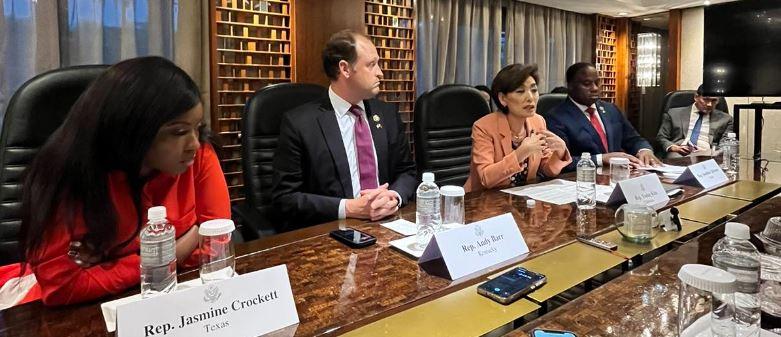US Congress to support military action if PH forces attacked, solons say

The US Congress will support American military action to defend the Philippines under the 1951 Mutual Defense Treaty if Filipino forces come under an armed attack, a bipartisan delegation of US lawmakers said.
The legislators including the chairperson of the House subcommittee on the Indo-Pacific and members of the Foreign Relations Committee, also indicated that there was financial support in the US budget for the Indo-Pacific region, with "the lion's share... to come specifically to the Philippines."
The American legislators separately met with Defense Secretary Gilberto Teodoro Jr., Foreign Secretary Enrique Manalo and top Philippine Coast Guard officials Thursday.
They granted an interview with GMA News Online and another Philippine news outlet after the talks, which they said focused on growing alarm over China’s aggression.
“We stand in full support to honor our commitment to stand by your sovereignty and security," Illinois (D) Rep. Jonathan Jackson said when asked if the US Congress would back US military action to defend the Philippines.
“Congress will stand united in supporting that, yes, and that includes attacks on Philippine vessels,” California (R) Rep. Young Kim said.
The MDT, a 1951 defense pact signed between Manila and Washington, binds the two allies to come to each other’s aid from aggression and help defend the other party.
According to Texas (D) Rep. Jasmine Crockett, “there is very little that is bipartisan currently in the United States.”
“Under no uncertain circumstances do I want anyone to be confused. We are united in the House as well as I would speak for the Senate and say that we are united against the aggressiveness not only here but the aggressiveness that we see with the PRC throughout the world right now,” she said.
“So, it is important that we support the Philippines because we can’t allow China or any other country to decide that they want to decide to engage in lawless activities and that’s exactly what we see going on," she added.
Crockett continued, "So we’re here because we want to make it clear that this is a real friendship and real friendship shows up when you need us, real friendship is something honestly that is ever present."
“Our presence here represents that this is our commitment that we’ve been here in person and have taken time to meet with the ministers of different levels of government to show this commitment that our government has made and that we will honor and keep it,” she said.
Under the US Constitution, the US President as commander-in-chief may commit US armed forces into action overseas but is obliged to notify the U.S. Congress within 48 hours of such action, as provided for under the U.S. War Powers Resolution of 1973.
The same resolution requires that such commitment of US armed forces could not go beyond 60 days, with a further 30-day withdrawal period, without US congressional authorization. This means that US congressional authorization is needed only if the engagement of US armed forces abroad would go beyond 60 days.
US Secretary of State Antony Blinken has repeatedly reaffirmed Washington’s commitment to stand by the Philippines against aggression and warned China that an attack on the Philippine military in the South China Sea would trigger the MDT.
“The MDT in my mind is very clear. If there is an armed attack against a Philippine asset then we are treaty-bound to support that, the Philippines,” said Kentucky (R) Rep. Andy Barr, a member of the US House Foreign Affairs committee.—LDF, GMA Integrated News



